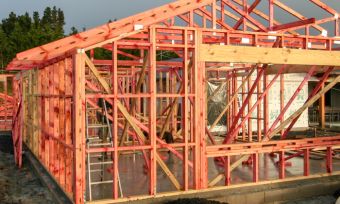Key points:
- When house flipping, ensure that you buy a house with potential, and don’t overpay.
- Thoroughly plan your budget, and then stick to it.
- Do as much of the renovation work as you can, but trust professionals for crucial jobs.
- Build some wriggle room into you budget and timetable, in case your renovation project doesn’t go to plan.
What is house flipping?
House flipping is an investment approach that typically involves buying undervalued properties, renovating them and then selling them on at a profit. The aim is generally – theoretically at least – to complete the process quickly and to spend as little as possible on the renovation in order to maximise profit before moving on to the next flip.
When you consider the investment of finances, time and emotion that can be involved, flipping houses may not be for everyone. But for some ambitious Kiwi investors and renovators, the challenge and potential profit are significant motivators.
If you’re considering tackling a renovation project for profit, there’s a lot to think about: finding a suitable property, financing it, renovation costs and more.
1. Do your research
There are going to be high emotions and stress levels no matter how big or small your renovation, and if you’re committing hard-earned dollars to a project, you want the best results.
To alleviate some of the stress, make sure you have a very clear budget and stick to it. Ask your contractors for their best hourly rates and professional estimates of time and costs before you embark.
Shop around until you find a team that you feel comfortable with, and be upfront about your expectations and budget with them.
2. Make sure you buy well
If you expect to make a short-term return, it means that you’re going to have to buy well. This means walking away from any property that is not under-priced. Wait for the next one.
If you’re renovating, get your costings right. Commission a report into the condition of the property before purchase, so you don’t get unpleasant surprises as you renovate. And ensure you obtain any relevant planning approval.
3. Research your finance options carefully
Prepare a thorough, realistic budget to present to lenders, compare rates and shop around. You’ll most likely need to look at investor loans at floating rates, which tend to be higher than fixed-term residential loans.
And when considering your financing, always build a buffer into your repayment schedule, in case your building work runs over time or you’re not able to sell immediately.
4. Be prepared for the work and challenges involved
The only way to make a significant profit is to undertake structural renovations to a property. For example, adding extra living spaces, modernising it, adding an ensuite, making another room or adding an additional level. However, this type of work requires professional skills. It involves builders, architects, development planning and permits.
But spending a lot of money on a renovation can lead to overcapitalisation. Be aware that there are ceiling prices on homes in most areas; people aren’t going to buy the most expensive house on a street just because you’ve done it up.
5. Keep a close eye on your costs
It’s crucial to keep an eye on costs when renovating a property to ensure you don’t blow your budget and can make a profit when you sell. Doing the majority of renovations yourself can help cut down expensive labour costs. Try to hire tradies only for jobs you can’t do yourself, e.g. electrical work or plumbing.
To keep costs down, make sure to narrow your search to those neighbourhoods you can afford, not the ones you aspire to afford.
It might be best to start in outer suburbs, where there’s more potential for growth – maybe a house that needs some TLC that you can renovate yourself without spending too much and blowing your budget.
Risks to be aware of
As well as the points already covered, there are some other potential risks that may be worth considering when it comes to renovating for profit. These risks associated with flipping houses can include:
1. Market conditions
If house prices across the market fall, selling your property on at a higher price in the short term may be a challenge, even if you’ve improved it cosmetically or structurally.
2. Interest rates
Rising interest rates could mean higher loan repayments and pressure on your budget.
3. Having trouble selling
If you need to hold onto a property for longer than expected, the costs can quickly mount and eat into any eventual profit you might make.
4. Unexpected costs
Unanticipated renovation costs can derail even the most carefully planned budget. Having a building inspection carried out before buying a property can help you avoid nasty surprises.
About the author of this page
Bruce Pitchers is Canstar NZ’s Content Manager. An experienced finance reporter, he has three decades’ experience as a journalist and has worked for major media companies in Australia, the UK and NZ, including ACP, Are Media, Bauer Media Group, Fairfax, Pacific Magazines, News Corp and TVNZ. As a freelancer, he has worked for The Australian Financial Review, the NZ Financial Markets Authority and major banks and investment companies on both sides of the Tasman.
In his role at Canstar, he has been a regular commentator in the NZ media, including on the Driven, Stuff and One Roof websites, the NZ Herald, Radio NZ, and Newstalk ZB.
Away from Canstar, Bruce creates puzzles for magazines and newspapers, including Woman’s Day and New Idea. He is also the co-author of the murder-mystery book 5 Minute Murder.





Share this article